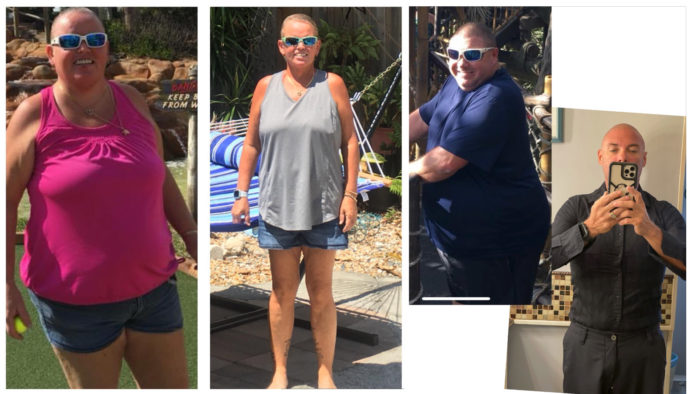
Let’s be honest: more than a few of our readers are undoubtedly part of the annual January flood that takes over gyms, healthy meal prep companies, and the Exercise & Fitness section of Amazon. But after a few weeks, when the realization hits that “this is actually hard” and fried food and Snickers bars start to look mighty enticing again, many will look for the motivation to break through barriers and keep going.
For those in need of inspiration, look no further than Shelly and Gary Steinbrugge, a pair of Marathon bartenders and servers. In just over one year, the couple has combined to lose a total of 240 pounds. That’s not a typo.
The Steinbrugges have been Keys residents for eight years, but began their mission in the fall of 2020 after a few bouts of heat exhaustion gave Gary a wake-up call. “I wasn’t able to perform at my job, couldn’t do anything around the house, couldn’t even go out with my wife and enjoy the things she wanted to do,” he said.
“He was a shrimper for 20 years on the same boat, and I thought he was going to have a heart attack on me,” said Shelly. “I begged him to change occupations and become a bartender.”
Shelly began walking a great deal as a way to avoid sitting around during the COVID-19 pandemic, but what started as a distraction soon turned into a steadfast habit. “Last year I did 961 miles in my workouts,” she said. “Now, we each try to walk at least four miles a day.”
Shelly soon persuaded Gary to join her workout regimen and try a keto diet, a low-carbohydrate, high-fat eating plan that attempts to use ketone bodies, produced by the liver from stored fat, as fuel. While many have touted success with the diet, conclusions about its risk and long-term efficacy still remain uncertain among scientists.
The couple eventually switched to more conventional and balanced clean eating, full of fruits, vegetables, lean proteins and salads, mixed with intermittent fasting. As an increasingly popular weight loss method, intermittent fasting allows dieters to eat within a certain period during the day, while abstaining from most food during the other hours – for instance, an eight-hour eating period, followed by a 16-hour fast. Even with increased portions at each meal, most following this diet achieve an overall caloric intake reduction throughout the course of a day.
“I found my biggest success with intermittent fasting, eating once at midday,” said Gary. “When you first start doing it, you snack a little throughout the day to keep cravings down, but once your stomach shrinks down a little bit, you really don’t miss the intake. Most people think you’re sort of starving yourself, but you’re really not.”
A commitment to their diets and consistent exercise paid off, as Gary dropped from 330 pounds to 180 pounds in barely over a year. Shelly, meanwhile, shed 60 pounds from her initial weight of 200. “My stamina is through the roof,” said Gary. “I’d barely be able to walk in the door after work before, or I’d go snorkeling and be out of breath in 15 minutes. Now I could probably swim five miles and not think twice about it.” He said his insomnia and sleep apnea have also disappeared.
Though the Steinbrugges’ story is a far cry from ordinary weight loss tales, they are confident that others can achieve similar results through persistence and moderation.
“You’ve got to stay away from late night eating, and the main key is not to have bad food in the house,” said Gary. “When I used to go out drinking, I would come home and want to binge eat. But once you can get away from it, you don’t think about it, and you don’t want it any more.” Even with clean eating, however, the two stressed the importance of allowing “cheat days” to enjoy comfort foods as occasional treats.
As far as workouts go, the couple has found that consistency and small, measured progressions have been the most vital components of their exercise program. “Don’t try to jump in with both feet,” said Gary. “If you take on too much, you’ll burn out and discourage yourself. If you can go out and do one mile today, the next day try a mile and a half. Just find out what you’re capable of. You don’t have to absolutely kill yourself every day.”
“If you put your mind to something, you’ll get it done,” the pair said. “You can say you want to, but if you really want to, you’ll do it.”



















